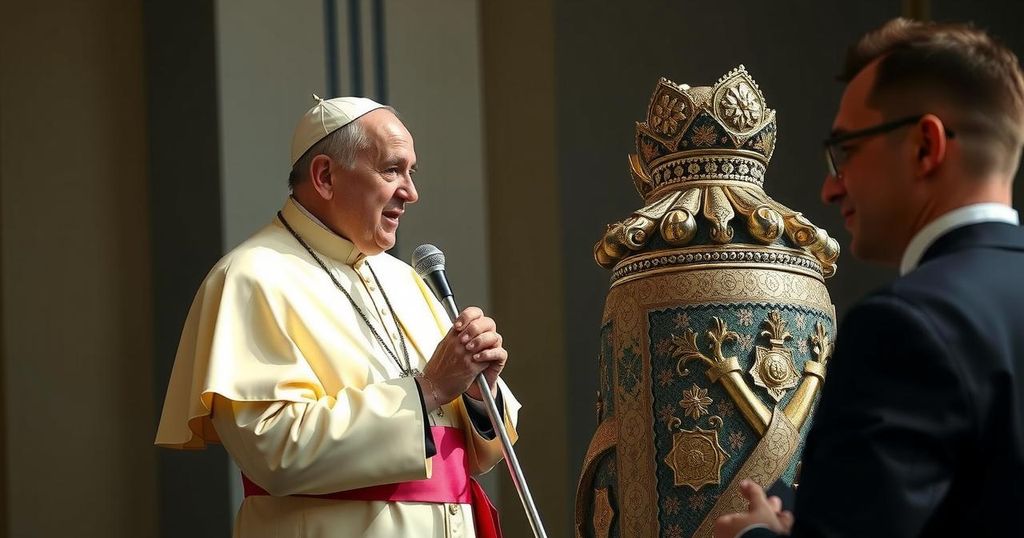Pope Francis and Kazakhstan: A Model for Interreligious Dialogue
Pope Francis’ call for interreligious dialogue has notably resonated in Kazakhstan, where a recent congress demonstrated the nation’s commitment to peace among diverse faiths. This partnership aligns with the Pope’s vision of global solidarity, emphasizing the role of dialogue in addressing modern challenges.
Pope Francis has consistently championed global solidarity and interreligious dialogue throughout his pontificate. Despite the escalation of global conflicts, his vision has found resonance particularly in Kazakhstan, a predominantly Muslim nation in Central Asia. On October 6, an interreligious congress convened in Astana, reflecting Kazakhstan’s commitment to the peaceful exchange of ideas across diverse faith traditions, underscoring the country’s alignment with the Holy Father’s ideals.
Held within the Palace of Peace and Reconciliation, the congress brought together leaders from Islam, Christianity, Judaism, and other faiths, emphasizing equality and shared human dignity. This gathering was attended by representatives from the Vatican, marking the significance of the Holy See’s role, despite Catholics constituting only a small fraction of Kazakhstan’s population. Inspired by previous interreligious efforts initiated by Pope St. John Paul II, this congress highlighted Pope Francis’ ongoing dialogue aspirations, supported by the 2020 encyclical “Fratelli Tutti,” which advocates for fraternity among all peoples.
Kazakhstan’s diverse society is reflected in its multitude of ethnic and religious groups, positioning the nation as a pivotal player in advocating for global peace. Ambassador Kairat Sarzhanov remarked on the shared vision of goodness and justice between Kazakhstan and the Catholic Church, highlighting the nation’s peaceful foreign policy since independence. Noteworthy historical initiatives include Kazakhstan’s voluntary renunciation of its nuclear arsenal and its establishment of a nuclear-weapon-free zone.
Despite these achievements, the country’s energy demands have instigated discussions on nuclear power viability, revealing a duality in its pursuit of sustainable solutions and its long-term commitment to peace. The interreligious meeting on October 6 encapsulated the collaborative spirit between Kazakhstan and the Holy See, reinforcing their dedication to addressing global crises through dialogue. President Kassym-Jomart Tokayev’s visit to the Vatican and subsequent events represent a deepening partnership founded on mutual respect and cooperation.
The relationship, while strong, faces challenges due to Kazakhstan’s regulatory framework governing religious groups. The 2011 Religion Law has attracted scrutiny for potentially limiting religious freedoms, although the continued growth of religious institutions indicates a resilient civil society. Recognizing the value of interreligious engagement, organizations such as the Nazarbayev Center echo the belief that dialogue is crucial to overcoming modern challenges.
Looking forward, the Apostolic Nuncio to Kazakhstan emphasized the opportunity for faith leaders to deepen their understanding and engage in constructive dialogue. The focus on “spiritual diplomacy” reflects a forward-thinking approach to addressing issues such as extremism and injustice through unity and understanding. The recent appointment of goodwill ambassadors and the participatory Youth Forum signify commitments to nurturing future generations in the art of interfaith dialogue, epitomizing the enduring vision of coexistence and respect among different faiths.
Pope Francis has been an advocate for peace and collaboration among religions since his papacy began over a decade ago. His outreach has aimed to create bridges among differing faiths as a means to address global conflicts and humanitarian crises. Kazakhstan, emerging as an unlikely center for interreligious dialogue, hosts an array of religious traditions, making it an essential player in advancing Pope Francis’ message. The meetings and congresses facilitated in Kazakhstan encompass both the spirit of the Catholic tradition and the aspiration for global solidarity, demonstrating practical implementations of interfaith cooperation.
Pope Francis’ advocacy for interreligious dialogue has found a concrete manifestation in Kazakhstan, where diverse faith traditions converge to promote peace and fraternity. The recent congress exemplifies the nation’s commitment to collaborate with the Holy See in fostering understanding among religions. By continuing to engage in meaningful dialogue, both Kazakhstan and the Vatican aim to address global challenges while encouraging future generations to cherish coexistence and cooperation across faiths. Kazakhstan’s approach to diplomacy and its dedication to interfaith engagement reflect a hopeful pathway towards greater global understanding and solidarity.
Original Source: www.ncregister.com




Post Comment